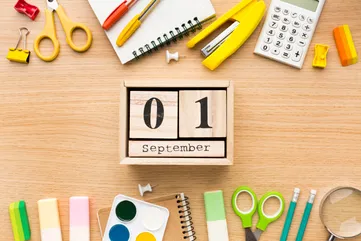Planning
Planning is the ability to create structured approaches for achieving goals by breaking them into sequential steps, estimating required time, and organizing resources effectively.
Why planning skills compound
Planning ability affects every area of life. It's the difference between proactive success and reactive stress.
Students with stronger planning skills achieve higher grades, report lower stress, and complete more extracurricular activities. Planning is a foundational executive function that enables all other goal-directed behavior.
You're not alone
If your teen starts projects the night before despite weeks of warning or can't figure out how to tackle multi-step assignments, they're showing typical adolescent planning deficits. Research indicates that planning abilities don't fully mature until the mid-twenties. Most teens need external scaffolding to plan beyond tomorrow. This isn't laziness but genuine developmental limitation.
What it looks like day to day
Student
Your teen knows they have five assignments due Friday but can't figure out how to start or what order to tackle them in.
Parent
You ask about your teen's plan for a big project and get a blank stare, as if the concept of planning hasn't occurred to them.
Tiny steps to try
- 1
Backward planning
Start with due date and work backwards. "If it's due Friday, when must each part be done?"
- 2
Task chunking
Break everything into 15-minute chunks. Big projects become less overwhelming as series of small tasks.
- 3
Planning templates
Create reusable templates for common situations. Essay template, project template, study template.
- 4
Time doubling
Whatever time teens estimate, double it. They consistently underestimate by about half.
- 5
Weekly planning ritual
Sunday evenings, plan the week together. Make it routine with snacks and music.
Why planning eludes teen brains
The prefrontal cortex responsible for planning is under construction until age 25. Teens literally lack the hardware for complex planning.
Planning requires:
• Visualizing future outcomes
• Breaking wholes into parts
• Sequencing steps logically
• Estimating time accurately
• Anticipating obstacles
• Coordinating multiple elements
Without these skills, teens live in perpetual crisis mode, always reacting to immediate deadlines.
Ready to help your teen thrive?
Get personalized 1-on-1 coaching to build better habits and boost grades. Join 10,000+ families who trust Coachbit.
Frequently Asked Questions
When should teens plan independently?
Full independent planning typically emerges in early twenties. High schoolers can manage daily and weekly planning with check-ins. Multi-week projects need adult scaffolding. College students usually need help with semester planning. Expect to provide decreasing support through age 25.
My teen makes plans but never follows them. Why?
Plans might be unrealistic, too detailed, or imposed rather than created collaboratively. Teen brains also struggle with plan execution even when planning is sound. Focus on making plans simpler and building in accountability checkpoints. Plans should be guides, not rigid prescriptions.
Related Terms
Executive Function
Executive function is your brain's management system that helps teens plan, focus, remember instructions, and juggle multiple tasks successfully.
Goal Setting
Goal setting is the process of identifying specific, achievable objectives and creating actionable plans to reach them within defined timeframes.
Prioritization
Prioritization is the ability to determine the relative importance and urgency of tasks, focusing energy on what matters most rather than what feels easiest or most immediate.
Time Management
Time management is the ability to plan, prioritize, and use time effectively to accomplish tasks and meet deadlines without constant crisis.
Related Articles

Finding Order in the Chaos – Setting up Calendars for Kids
Creating a calendar and daily schedule for kids can be beneficial to manage school, homework, extracurriculars and hobbies. Color-coding and time-blocking are helpful tools for kids with ADHD.
Read article
5 Goal Setting Principles to Motivate Kids
The 5 principles of goal setting can help kids to set and accomplish goals that are achievable. Effective goal setting can be motivation for kids.
Read article
